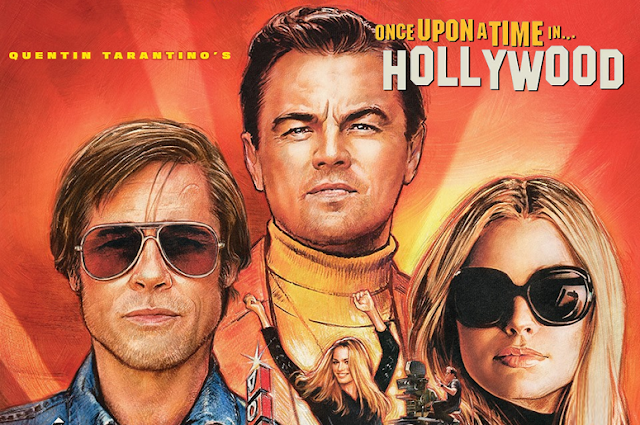Tarantino's Compassion - Once Upon A Time ... In Hollywood
As the credits rolled on Quentin Tarantino's Once Upon A Time … In Hollywood, Tom
Cruise's promotional work for the film Valkyrie
sprang immediately to mind. Even now, Cruise's remark that "I always wanted to
kill Hitler, I hated him!" strikes you as both peculiar and unnecessary. Not, of course, because of the sentiment, but
rather the picture it paints of a young Tom idling away his teenage bedroom years dreaming of time machines and outrageous movie plots about reversing the course of history. Perhaps a much darker sequel to Back to the Future. It is easy to forget, though, just how
tempting an alternative redemption story can be. And it's certainly one that appeals to Tarantino
as he went on to make Inglourious
Basterds a year after Cruise's film,
bumping off not just Hitler but Goebbels as well. Of course, Tarantino knows full well that if
you're going to do this you need to up the irony stakes and ensure that that you're
filling your reels with plenty of knowing winks to the audience.
 |
| "Is everything okay?" "Well, the hippies fucking aren't!" |
Tarantino's latest film, for me, is his best since Pulp Fiction. This time, rather than taking out the Führer before he can do any real damage [and here comes the major spoiler, blog readers], the director puts a stop to the Manson family's butchering of a pregnant Sharon Tate and her friends. I'll admit it, in the film's final furious five minutes, I wanted to cheer and applaud. It's a ridiculous and violent ending, in a film that, up until this point, had kept a firm check on gratuitousness. But it's also an incredibly entertaining one.
This could seem slightly disrespectful to those who knew
Tate and her friends personally (although Tate's sister Debra was very supportive of the film). Except, Tarantino's mastery and understanding of the banality of evil allows it to work. Ever since John Travolta's character in Pulp Fiction declared that "I didn't go
into a Burger King", I've realised that Tarantino - unconsciously or otherwise - understood just what it was that Hannah Arendt noticed when she gazed across the
court room at the shabby Nazi war criminal Adolf Eichmann. The most evil acts can
be carried out by men, and women, who, on the surface are unremarkable and commonplace. The instance that best exemplified that in
this film – although it is also a ruse and a plot device that enables one of
the disciples Flowerchild to escape – is her return to the locked car to pick up the
knife that she has forgotten, and the disciples' ring-leader Tex comments that "you'll need the car keys". Real life, clumsiness and forgetfulness, - the banal - are always intruding, before, during and after the most horrific events.
 |
| "Neither perverted nor sadistic ... just terrifyingly normal." |
The redemptive power of the movies is very much to the fore in Once Upon A Time … In Hollywood. My favourite moments in the film are those involving Sharon Tate - played by a wonderfully hazy Margot Robbie - and the glee and joy that she displays on taking a trip to the cinema to watch her own performances. You can almost forgive her for placing dirty feet on the cinema seat in front of her, as she looks behind her to see the rest of the audience laugh out loud and cheer at her character's antics. Yes, Tarantino is telling a tale partially about a disillusioned actor - Rick Dalton played by Leonardo DiCaprio - coming to the end of his sporadically successful career, consumed by alcohol and self-loathing. But it is also a tale that doesn't let you forget the magic of the big screen and that, certainly at the start of a career, the sense of amazement that young stars must feel is palpably joyous. Indeed, the exchange between the eight year old child actor Trudi and Dalton prior to their shooting of a scene causes the latter to break down in tears and experience a brief and fleeting epiphany that is genuinely touching.
 |
| Margot Robbie as Sharon Tate - probably passing on the popcorn and Haribo |
Which is all very peculiar, as I've never thought of Tarantino's films as being life-affirming. Even now that seems an odd takeaway. Is Quentin going soft? Not if there's a flame thrower to hand. But there is a greater degree of nuance in this film, one that concerns itself with humaneness and isn't just generated through pop culture references. It's something that I've not seen him do before, and because of that he has made, not just an incredibly entertaining piece of cinema, but also a genuinely moving one.


Comments
Post a Comment